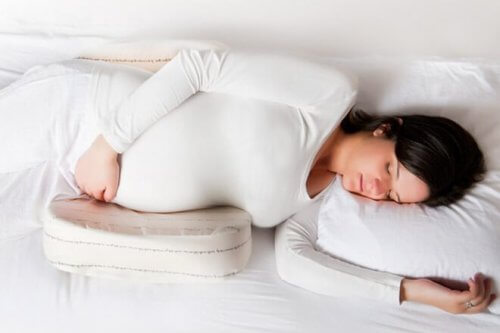4 Sleeping Positions to Get the Rest You Need during Pregnancy

If you’re pregnant, then sooner or later you’ll come to the point where sleeping becomes a challenge. Finding comfortable sleeping positions in bed for you and your belly can be quite difficult.
Women in their third trimester often spend hours searching for a comfortable position before finally falling asleep.
Unfortunately for many women, the sleeping positions they’ve adopted all their lives are no longer useful during pregnancy. T
his is because our bellies are constantly growing and make certain positions uncomfortable or even impossible.
While the growth of your belly is the main reason that falling asleep becomes an issue, it’s definitely not the only reason. There are physical and emotional changes that are also to blame for your restless nights.
The good news is, we’ve got some advice for you. There are several sleeping positions that any expectant mother can put into practice in order to finally get some rest.
Sleeping positions for mothers-to-be
Many expectant mothers recommend the following sleeping positions. Try them all and discover which is most comfortable for your own body.
Lie down on our body’s left side
This position is the most highly recommended by maternity experts. There’s a specific reason doctors suggest sleeping on your left side.
It helps blood and nutrients flow more easily to the uterus and, therefore, your baby.
But not only that, it’s proven that this position makes it easier for your kidney to eliminate waste and fluids.

Sleep on one side with a pillow between your legs
One of the virtues of this position is that it will really help you maintain your spinal column straight. That way, you can avoid placing all the weight of one leg on the other.
You can even opt for extra long pillows. These allow you not only to rest your leg on the pillow, but also your belly, providing maximum security.
Elevate your legs
As your belly gets bigger and bigger, you may start to suffer a rather uncomfortable issue when trying to get to sleep. Cramping in the legs and swollen feet are a common affliction.
If you tend to have poor circulation and your legs get swollen, try elevating them when you sleep.
All you need to do is place a pillow or two under your feet while you rest. This will help with blood flow and lessen cramping and jabbing in your lower body.
In addition, this technique will reduce the appearance of varicose veins.
Semi-inclined position
You may experience issues like gastritis, reflux, or pain associated with bad indigestion during your pregnancy. Don’t worry, this is all normal.
To help alleviate discomfort, try sleeping in a semi-seated or inclined position. Use pillows or cushions for support. This technique will reduce pain and allow you to rest.
“Sleeping on your body’s left side is one of the most highly recommended positions”
What sleeping positions should you avoid during pregnancy?
Sleeping on your stomach
This may seem like an obvious no-go during advanced pregnancy just because of the sheer logistics of it. However, we still want to explain exactly why this position is not recommended.
First of all, sleeping facedown can cause poor circulation due to the pressure on your uterus, intestines and vena cava. This can also affect your digestion.

Sleeping on your back
You may be a bit more surprised to find out that sleeping on your back is also dangerous. First, this position can cause pain and even serious back problems.
But sleeping on your back also reduces the quality of your breathing and negatively affects your digestive system. Lying on your back also contributes to the appearance of hemorrhoids and low arterial blood pressure.
Lastly, it can even cause a reduction in blood circulation to your heart and your baby’s heart as well.
Conclusion
Give these sleeping recommendations a try until you find what works for you. Also, talk with a trusted doctor about the benefits and dangers of different sleeping positions.
Remember to get as much rest as possible during your pregnancy – for your own benefit and for the benefit of your baby.
This text is provided for informational purposes only and does not replace consultation with a professional. If in doubt, consult your specialist.
